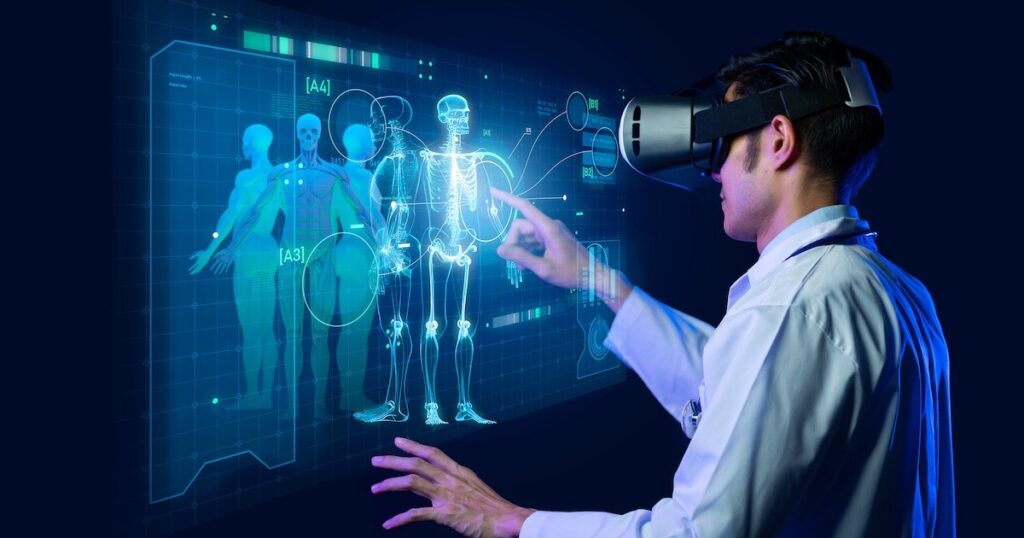AI in Healthcare: How Generative Models Are Transforming Diagnostics and Treatment
Published: 3 February 2025
The integration of artificial intelligence (AI) into healthcare has long been a topic of discussion, but in 2025, we are witnessing AI’s true potential being realised. One of the most exciting developments is the rise of generative AI models, which are transforming how we diagnose diseases, plan treatments, and predict patient outcomes. From faster diagnoses to personalised treatment plans, these AI systems are helping doctors and healthcare providers deliver care more effectively and efficiently than ever before.
Generative AI: A New Era in Medical Diagnostics
Traditionally, diagnostic processes in medicine rely on human expertise, lab tests, and imaging scans. However, generative AI is changing the way doctors approach this challenge. By analysing vast amounts of medical data—such as X-rays, MRI scans, and patient records—AI systems can now generate insights that would be almost impossible for a human to identify on their own.
Take, for example, the AI-powered diagnostic tool developed by MedAI, a leading health-tech company. MedAI’s generative model can analyse radiological images and generate not only a diagnosis but also a detailed report that outlines the likelihood of various conditions, from cancers to rare diseases. This allows physicians to make more accurate and quicker diagnoses, even in the case of conditions that might not be immediately obvious.
Moreover, the AI doesn’t stop at diagnosis—it can suggest treatment plans based on an individual’s specific condition and medical history. This level of precision and personalisation can drastically reduce treatment errors and improve patient outcomes.
AI-Generated Personalised Treatment Plans
One of the most groundbreaking uses of generative AI in healthcare is its ability to create personalised treatment plans. Every patient is unique, and their responses to medications and treatments can vary widely. By analysing data from genetic sequencing, electronic health records (EHRs), and clinical trials, AI can predict how a specific patient will respond to various treatments, reducing trial-and-error methods that can be time-consuming and risky.
For instance, AI-powered platforms like DeepMed use generative models to simulate potential treatment outcomes for patients with chronic conditions like diabetes, heart disease, or neurological disorders. The AI then generates a customised plan, incorporating everything from lifestyle changes to pharmacological interventions, ensuring a highly tailored and effective approach.
The Future: AI as a Collaborative Tool in Medicine
Despite its promise, AI in healthcare is not about replacing doctors—it’s about augmenting their capabilities. Generative AI serves as a powerful tool for clinicians, enabling them to make better-informed decisions based on data-driven insights. The most successful healthcare systems will be those that use AI as a collaborative partner, working alongside human professionals to provide the best care possible.
The integration of generative AI with robotic surgery, telemedicine, and patient monitoring systems also holds immense potential. AI-powered surgical robots, for example, can generate real-time recommendations during surgery, adjusting procedures on the fly based on a patient’s condition.
Challenges and Ethical Considerations
While the potential benefits of generative AI in healthcare are enormous, there are several challenges to consider. Data privacy and security are significant concerns, as sensitive health information must be kept confidential and secure. Moreover, AI systems need to be trained on diverse datasets to ensure they are equitable and do not unintentionally perpetuate biases.
In addition, there’s the challenge of trust—patients and healthcare providers alike need to feel confident that AI-generated diagnoses and treatment plans are accurate and reliable. This will require rigorous testing, transparency, and clear guidelines for the responsible use of AI in clinical settings.
The Road Ahead: A More Efficient, Personalised Future
Generative AI is already having a profound impact on the healthcare industry, and its potential for improving both diagnostics and treatment is just beginning to be realised. As technology advances and becomes more integrated into healthcare systems worldwide, we can expect to see even more sophisticated applications, from early disease detection to personalised, real-time treatment adjustments.
The future of healthcare is undoubtedly more data-driven, efficient, and personalised, thanks to AI—and the benefits will be felt not only in the medical field but across society as a whole.

